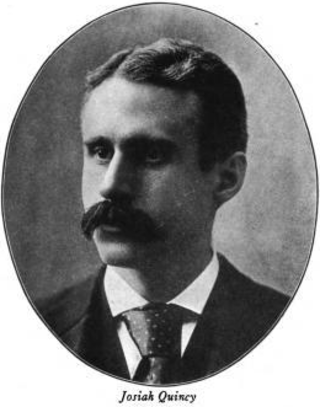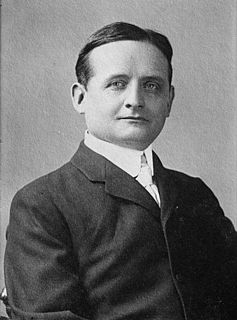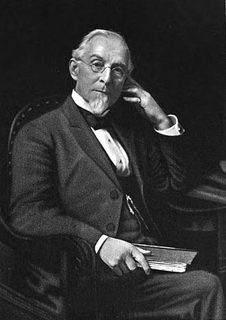
The Mayor of Boston is the head of the municipal government in Boston, Massachusetts. Boston has a mayor-council system of government. Boston's mayoral elections are non-partisan, and elect a mayor to a four-year term; there are no term limits. The mayor's office is in Boston City Hall, in Government Center.

George Albee Hibbard was an American political figure who was the Mayor of Boston from 1908 to 1910.

Josiah Quincy VI was an American politician from Massachusetts who served as Mayor of Boston from 1896 to 1900. His grandfather Josiah Quincy IV and great-grandfather Josiah Quincy III also had served as Mayors of Boston.

The Boston mayoral election of 1951 occurred on Tuesday, November 6, 1951, between Mayor of Boston John B. Hynes and former Mayor James Michael Curley. Hynes was elected to his second term.

The Boston mayoral election of 1949 occurred on Tuesday, November 8, 1949, between incumbent Mayor of Boston James Michael Curley, city clerk and former acting mayor John B. Hynes, and three other candidates. Hynes was elected to his first term.

Boston City Council elections were held on November 2, 1993. All thirteen seats were contested in the general election, while ten seats had also been contested in the preliminary election held on September 21, 1993.

Boston City Council elections were held on November 6, 2001. Nine seats were contested in the general election, as the incumbents for districts 1, 5, 8, and 9 ran unopposed. Two seats had also been contested in the preliminary election held on September 25, 2001.

Boston City Council elections were held on November 4, 2003. Nine seats were contested in the general election, as the incumbents for districts 2, 3, 5, and 7 ran unopposed. Six seats had also been contested in the preliminary election held on September 23, 2003.

The Boston mayoral election of 1925 occurred on Tuesday, November 3, 1925. Malcolm Nichols, a former member of the Massachusetts House of Representatives and Massachusetts Senate, defeated nine other candidates to be elected mayor.

The Boston mayoral election of 1921 occurred on Tuesday, December 13, 1921. James Michael Curley, who had previously served as Mayor of Boston (1914–1918), was elected for the second time, defeating three other candidates.

The Boston mayoral election of 1917 occurred on Tuesday, December 18, 1917. Andrew James Peters, Assistant Secretary of the Treasury, defeated incumbent Mayor of Boston James Michael Curley and two other candidates.

The Boston mayoral election of 1914 occurred on Tuesday, January 13, 1914. James Michael Curley, member of the United States House of Representatives, was elected Mayor of Boston for the first time, defeating Thomas J. Kenny, president of the Boston City Council.

The Boston mayoral election of 1910 occurred on Tuesday, January 11, 1910. John F. Fitzgerald, who had been Mayor of Boston from 1906 to 1908, defeated incumbent George A. Hibbard and two other candidates.

The Boston mayoral election of 1907 occurred on Tuesday, December 10, 1907. Republican candidate George A. Hibbard defeated Democratic candidate John F. Fitzgerald, the incumbent Mayor of Boston, and John A. Coulthurst, an Independence League candidate. Primary elections for each party had been held on Thursday, November 14, 1907.

The Boston mayoral election of 1905 occurred on Tuesday, December 12, 1905. Democratic candidate John F. Fitzgerald defeated Republican candidate Louis A. Frothingham, and four other contenders, to win his first term as Mayor of Boston. Primary elections had been held on Thursday, November 16, 1905.

The Boston mayoral election of 1903 occurred on Tuesday, December 15, 1903. Democratic candidate and incumbent Mayor of Boston Patrick Collins defeated Republican candidate George N. Swallow, and two other contenders, to win a second term.

The Boston mayoral election of 1899 occurred on Tuesday, December 12, 1899. Republican candidate and former Mayor of Boston Thomas N. Hart defeated Democratic candidate Patrick Collins, and two other contenders, to become mayor for the second time. Incumbent mayor Josiah Quincy had announced in July 1899 that he would not seek re-election.

The Boston mayoral election of 1897 occurred on Tuesday, December 21, 1897. Democratic candidate and incumbent Mayor of Boston Josiah Quincy defeated Republican candidate and former mayor Edwin Upton Curtis, and two other contenders, to win re-election to a second term.

The Boston mayoral election of 1895 occurred on Tuesday, December 10, 1895. Democratic candidate Josiah Quincy defeated Republican candidate and incumbent Mayor of Boston Edwin Upton Curtis, and one other contender, to win election to his first term.
















